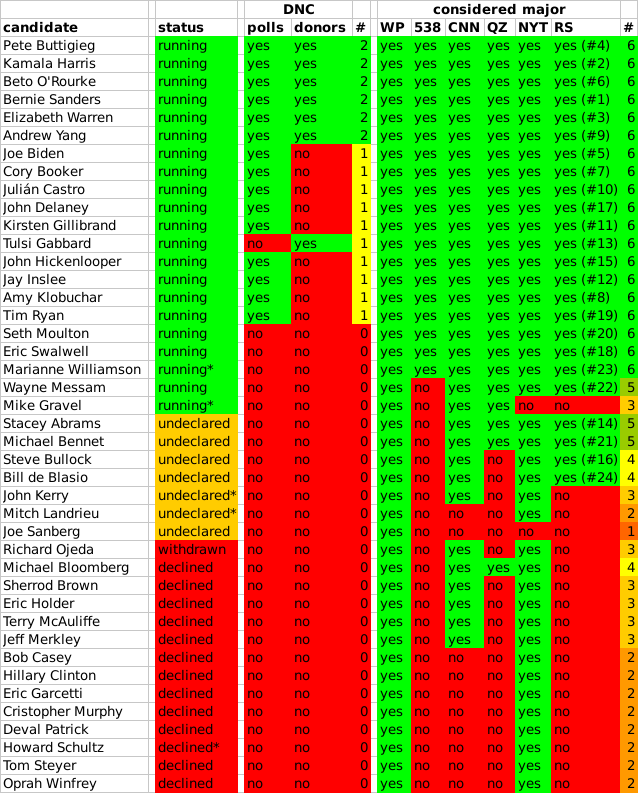Mnementh said:
All media have slightly differing lists of 'major' candidates. In the list I made for my post you can see it:
You can see for instance, that Mike Gravel is counted major only by Wikipedia, CNN and Quartz. It is further complicated by the fact, that undeclared candidates are often included in such lists. For the ones I looked at, only Wikipedia and Fivethirtyeight had a definition of major that was communicated (the other media might have a definition, but I didn't saw it). Wikipedia says: "In addition to having filed with the Federal Election Commission to run for president in the Democratic Party primary in 2020 and having confirmed this by an official campaign announcement, the major candidates in this table below have either: ( a ) held public office; ( b ) been included in a minimum of five independent national polls; or ( c ) received substantial media coverage." Obviously c itself needs further definition of "substantial", but the other two are pretty clear. Fivethirtyeight includes everyone as major, who fits the criteria for the debates as published by the DNC and additionally candidates for who at least six out of ten questions can be answered with yes. These question include four about serious running (formally declared a campaign not only exploratory committee, is running to win, has hired at least three paid staff, is campaigning outside home state), two about public office (held public office, held public office of one of these: president, vice president, governor, U.S. Senate, U.S. House, mayor of a city of at least 300,000 people, member of a presidential Cabinet), and four questions about public impact (included in half the polls, gets half media coverage of candidates qualifying for the debates, half the google search traffic, at least one endorsement of the ones tracked by 538). The other media outlets have as I said no clear definition, but there are some things that seem to be universally accepted:
These are the unofficial criteria I see often qualifying candidates. With this said, most of the candidates (who filed with the FEC) are not covered based on that, including for instance:
Of the candidates usually counted as major only two are actually outside the circle of politician which are counted because of their previous elected offices, that are Marianne Williamson and Andrew Yang. This shows that candidates which don't start as U.S. senators, U.S. representatives, governors or former secretaries (or at least DNC officials, state senators/representatives or mayors) have a hard time to join the 'major' club. |
That's an excellent breakdown! I like 538 as a conservative estimate of the people who are probably major contenders for the long haul, while Wikipedia is obviously an exhaustive list and the others are in between, though honestly the list we have in the OP is probably the best.

















